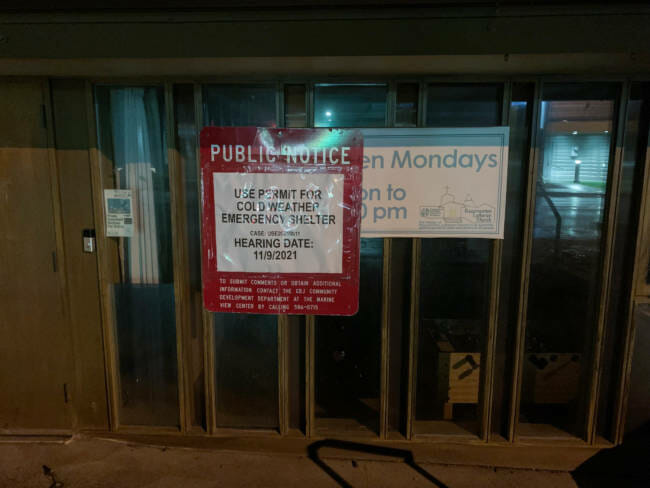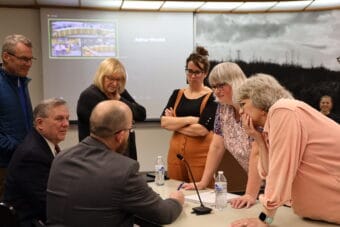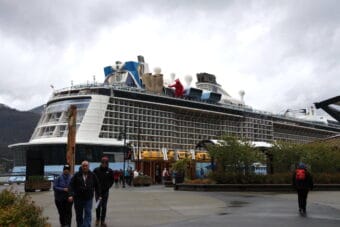
Juneau’s cold weather emergency shelter will be at the Resurrection Lutheran Church near downtown this winter. The city’s planning commission voted on Nov. 9 to approve the church’s conditional use permit to hold the shelter with some conditions.
The cold weather emergency use shelter was created in 2017 and has been run by a few organizations around town since. St. Vincent de Paul had run it since the end of 2019. Last month, the nonprofit pulled out of its contract with the City and Borough of Juneau to provide the shelter.
That is when the Resurrection Lutheran Church stepped in. Employees at the church have experience working with the unhoused population in Juneau. Without another viable option and with such short notice, Karen Lawfer and others at the church felt obligated to step up.
“We knew that it was going to get cold and we knew that people needed a place to go,” Lawfer said. “And as such, we have been working nonstop to get this process going so that those who are less fortunate than we will be able to have a place to stay and a meal.”
People living in the neighborhood surrounding the church said during the planning commission meeting that they have concerns. Most were related to safety around the neighborhood — for children going to school, people using the night drop at First National Bank, business owners and for residents in the Flats neighborhood.
Alicia Bishop called in as a representative of the Harborview Elementary Site Council, which includes parents and teachers at the school. She opposed the shelter location on behalf of the council and asked the city to find a different spot.
“Our biggest concern is the overlap of students with those exiting the shelter in the mornings, and especially at congregation points such as where school and public bus stops coincide,” Bishop said.
Naomi Davidson was conflicted about the proposal. She felt like the proposal was rushed but she also does not want unhoused people to be left out in the cold.
“I’m not against it. I’m against the way that this came about so quickly, with very little participation, and planning to, to create a whole plan to provide whole services for all of the participants and all of the partners,” Davidson said.
Some people suggested having more of a police presence in the neighborhood but Davidson doesn’t think that is the answer and doesn’t want to criminalize people experiencing homelessness.
Other people called in to offer their support. One of them was Doniece Gott. She said that people are building up a lot of fear for a problem that doesn’t exist.
“We need to model for our children and we should model compassion and love and respect for our fellow human beings instead of treating them poorly and othering them,” Gott said.
Jerrick Hope-Lang, an Indigenous homeowner in the Flats, also called into the meeting to support the shelter. He said that the concerns people are voicing really come with the territory of being downtown.
“And with the recent loss of some Native people in our community, I just think it’s really important that we not forget that there needs to be a secondary option, especially with the loss of shelter in the downtown area,” Hope-Lang said.
To address people’s comments, the planning commission put nine conditions on the permit. All the conditions were passed.
Three of those conditions were suggested by the city’s planner, Allison Eddins. Those conditions are:
- Smoke detectors must be installed in the sleeping area and in bathrooms;
- An alarm must be installed at the emergency exit near the sleeping area;
- If new lights outside the church are installed, a light plan must be given to the community development department;
Six conditions were suggested by the planning commission:
- Security cameras outside the building must be installed and operational before opening the shelter;
- The shelter must operate no earlier than 9 p.m. and close 6:30 a.m. the next day;
- The shelter can operate Nov. 1 – May 1;
- When the shelter is operating, there must be two staff present at all times;
- The permit will expire May 2022;
- The facility will provide a contact number for people in the neighborhood that will be answered during the shelter’s operating hours
In the meeting, commissioner Nathaniel Dye said that this is the fastest moving conditional use permit he has ever seen and that the process felt rushed. That is why he wanted the expiration of the permit as a condition of approving it.
These permits don’t usually have an expiration date and some commissioners were concerned about setting a precedent for future permits.
“The precedent is relieved for me from the fact that there is an emergency situation for … It’s a life safety issue at this point,” Dye said.
Now that the church has its permit approved, it can start housing people when the weather gets below freezing. It is forecasted to be below freezing at night for most of next week.
To contact the church about the warming shelter, you can send an email or call 808-782-5795.
A previous version of this story mistakenly referred to Karen Lawfer as Karen Laughlin.



